 Years ago when I entered religious life I remember my novice director saying something to our new group which seemed really strange at the time. After we had our formal entrance she said she would pray for us daily and part of that prayer would be that we would have little to do. What a thing to say to novices who had barely begun! But as time went on I realized what she meant. All of us who had entered were coming from busy professional lives, and so we needed to learn how to slow down and listen to the Lord. Her prayer was not a wish that we would be bored. Rather, she hoped we would not become so distracted by classes and the busyness of the retreat house in which we lived that we would forget to listen to God. We were in formation and we needed to become women of prayer. It meant that she was praying we would learn to become more aware of God around us and fall more deeply in love with Him. One can only do that by making our time available to God. Anyone growing in the spiritual life needs to have some non-distracted time for God. It needs to be a consistent effort to make time available not just for God, but to Him. Both are good and we need to do both, but the distinction I am making is this: time for God can be time in which we serve Him, or we think about Him, or even send off a quick prayer for someone or for ourselves. Time available to God is time in which I make myself totally open to Him, listening and being present to Him, as He is present to me. This means habitual, focused, dedicated time which is directed toward prayer; it cannot be done in 5 minutes here or there. It is the personal prayer period which is time spent meeting with God, as one spends time with a dear Friend who waits for our daily arrival. Prayer all day long in bits and pieces is not a bad thing. It means our minds and hearts are attuned to God. In fact, St. Paul says to pray always, (1 Thessalonians). But if we do not have a foundation, that is, a relationship based on significant time spent with the Lord, we will not progress in our spiritual lives. The reality is that prayer takes work, just as any other relationship does. It takes discipline to return every day to meet with the Lord in order to allow Him to mold us. It has to be a priority in our lives. Just as I see people running or jogging day after day, I know that there are days some of them may not want to be there. But they know if they want to grow healthier, or to run a marathon, or whatever their goal is, they have to do it every day. So it is with prayer. If my relationship with God is not a priority, then I will not put in the time I need to do more than just tell Him my needs and wants. If I do not avail myself to Him, I will not grow very readily in the spiritual life. There is no easy way to sanctity without spending time with God in prayer. Just as an athlete cannot even think of competing without all the training that comes before it, one cannot advance in the spiritual life without working at it. In the early church those who retreated into the edges of town, often said to be living in the desert, were called ascetics. The word ascetic comes from a Greek word, askein, which means, "to train as an athlete." The early ascetics began the practice of prayer out in the desert because they wanted to become true disciples of Jesus. They wanted to give all in the only way they knew, which meant leaving everything and retreating to the desert to become like Christ, fully submissive to the Father so they could take what they learned back into the community to serve. They wanted to grow in relationship with God because they loved Him.  In the fourth century, Evagrius Ponticus was the leader of such a community. He came up with a list of evil thoughts or temptations to avoid. These eventually became what we now refer to as the seven deadly sins. (Originally he had eight on his list, but that might be the subject of another blog.) One of the temptations Evagrius warned his brother monks to beware of is acedia, which is a type of spiritual laziness. He referred to it as “the noonday devil.” This laziness was a kind of stupor into which the monk would find himself sinking. It was a spiritual boredom which would overtake many of the monks every day when their practice of praying became tedious. They would rise with the dawn, fervent in prayer. Then as the morning progressed they would become more and more tired and distracted in their efforts. By noon when the heat of the day was upon them, they would quit their efforts at prayer. Hence, the noonday devil was the attitude which tempted them to simply give up. This term also refers to the malaise that can overtake the entire journey in the spiritual life in prayer. When we are beginners we are in a type of honeymoon phase. Everything feels good, easy, light. We are eager to pray because of our love for God; we have a lot of consolation, that is, a sense of God’s presence. But then it suddenly begins to feel like nothing we do is working, that He is long gone, and we are tempted to give up. In reality what has happened is that God has gone deeper, beyond our ability to feel or sense His presence and He invites us to that new depth. He is indeed present, but now we have to enter into the dryness of what feels like a lack of all those felt assurances we once had. The honeymoon is over and the real work of growth in the relationship begins. The noonday devil, then, is the temptation to give up on this process. We get so frustrated with what feels like a lack of progress that we often simply stop praying. The worst problem with the noonday devil is that this attitude can spill over into other things and can deceive us into stopping other spiritual practices as well. We can feel like Mass or other spiritual practices are dry, so we cut back or stop altogether. Everything becomes routine; we become complacent and life seems to be okay, so the fire of our love gets cooled. Little by little we are lulled away from what once was a priority, and God slips to the background. Oh, we do not stop believing, but we become stunted in our spiritual life. Evagrius warned the monks not to give up when prayer became difficult. He knew that we can be tempted into thinking that God has abandoned us when the exact opposite is what is true. St. Ignatius Loyola, (and other writers about prayer such as St. John of the Cross, St. Teresa of Avila, and St. Francis de Sales), counseled us not to give into this temptation. St. Ignatius said that when prayer seems dry and too laborious, boring, or like an empty pursuit, that we should pray 5 minutes longer than we originally planned! He says to move against the temptation to quit. So let us remain steadfast and strong in our efforts at prayer. All attempts at prayer are good, but we need to put in the time if we want to grow. We can ask the Holy Spirit to give us what we need to hang in there when it seems dry, trusting that it is an invitation to deeper prayer. The more we grow in prayer, the more our hearts are moved with compassion to serve the Lord by serving others. The more we serve, the more we begin to see the presence of God around us. And the more we see the presence of God around us, the more we fall in love with Him. It is a wonderful process and it is His gift to us.  May each of us have the perseverance to stay on the journey when our prayer begins to feel dry! May God enliven the graces of faith, hope, and love which we were given at Baptism so that we trust Him during times of temptation! May we have the courage to trust that God never leaves us alone at any time in our journey! And may we know the presence of God, which is the love that is so deeply embedded in our hearts that it is beyond words! Let us meet in the Heart of the Lord where He shields us from the noonday heat! Peace! All the photos are mine, from a trip to New Mexico last year. 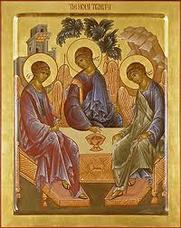 In the years when I was teaching high school theology I taught the Sacraments to sophomores. During the chapter on Marriage we would discuss relationships, which of course would center on a discussion about love and what it is. I would present some definitions of love, most of which are honestly not all that appealing. For example, in psychological books love is often defined as something like "warm personal regard." I had these images of a man on bended knee before his beloved telling her he had warm personal regard for her and asking her to marry him! Not overly romantic, to say the least! The dictionary says love is "affection based on admiration or benevolence”, and goes on to say it is “a warm attachment or devotion." We may be getting closer, but this still does not stir my blood. The best definition of love I know comes from St. Augustine who says something like this: The Holy Trinity is the eternal exchange of love between Father, Son, and Holy Spirit which is extended out to us. What this is saying is that God is love; if you want to know what love is, get to know God. In other words, love is mystery, but it is accessible to us through our relationship with God. Love, therefore, is who and what God is. I hope you are not surprised to find that I defined love by saying “who” the Trinity is. The very nature and essence of God is love. We read this in 1 John 4:7 and the verses which follow. Love is not easily defined, but it is described with every word in Scripture. And the Church rejoices in this love by celebrating the Feast of the Holy Trinity this coming Sunday. The Trinity is God, Three Persons in One God: the Father who is the Creator, the Son who is the Redeemer, and the Holy Spirit who is the Sanctifier. This reality is what we call an absolute mystery: it is a mystery the depths of which can never be plumbed by humans during this life. But St. Augustine gives us insight into what it means to say that the Trinity is bonded by love and therefore God is love. It is something we can grasp even though how this is remains a mystery. 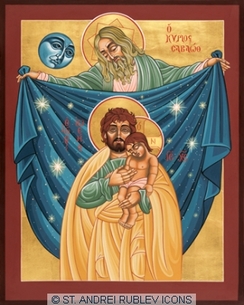 So what is love? Love is the action of God as Father when He created all that exists for us so that we may be happy and so that we may be forever in relationship with Him. He made us so that we may be loved. The very nature of love is that it has to be mutual. Without an object of one's love, there is no love at all. One cannot love in a vacuum; there has to be a beloved. In other words, as St. Augustine's definition clearly implies, love is mutual. It has to be given to a beloved in a mutual exchange. Love is the driving force behind the Father giving us forgiveness after we chose to reject love by choosing sin. It is what inspired the Father to send all sorts of leaders and prophets (in Old Testament times) to try to guide His people again and again as they became a nation. Love is what compelled the Father to make covenants, which are eternal agreements based on love, with His people so as not to lose any of them. The Father must have wept every time His love was rejected by His people when they strayed to paganism or when their enemies overtook them, and He must have rejoiced every time they returned to Him or when they stood firm in their faith. Love is the action of the Father in giving us His Son. Love is the Incarnation: the Son came into the world to become one of us and live among us. Love is the Son of God becoming enfleshed so that He could begin the Kingdom of God among us, and then suffer, die, rise, and be glorified so that we may have salvation. Love is the action behind every one of the miracles performed by Jesus. It was love that healed and it was love that preached. It was love which wept over Jerusalem and which wept over the death of Lazarus and no doubt wept in secret over the Pharisees and Sadducees who refused His love and friendship. I have always been sure that Jesus often wept when He would go apart to pray to His Father. He must have felt so much of the pain which comes from love. That is, because of His love for all His people, He must have suffered much during His ministry when they would reject Him and His message of love. 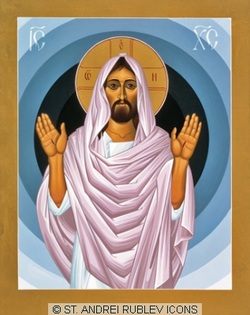 Love is the Father letting His Son go to the cross to die a horrifying death for us. Theologians tell us that God (referring here to the Father) cannot suffer pain. True, He cannot be diminished by pain, but God is compassion and love, therefore He does suffer. There is no way God could be out of touch with suffering. If He was, He would not have chosen it as the way to redeem us, which is the ultimate act of love of both the Father and the Son. I simply cannot imagine our Father blithely watching His Son die on the Cross without weeping copious tears. (To anthropomorphize God, or to portray Him with human attributes, is the only way we can conceive of how He might suffer.) I believe that God weeps when we weep. When His children are in pain He no doubt weeps with us, such as after a calamity like the one which just befell the people of Moore, Oklahoma or the people of West, Texas. Suffering is a mystery, but as I said, it must have great value or God would not have chosen suffering to show us His love by going to the cross. That He joined in our pain tells me that He wants to be in it with us, not simply observing it from afar. I do not pretend to understand why we suffer or why some suffer more than others. But I do know those who suffer are close to God because they can relate most to the suffering of His Son and He can relate to what they are going through, having experienced it in this life. 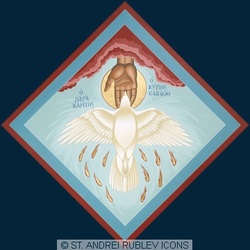 Love is the Holy Spirit coming down upon His people at Pentecost to give birth to a new community. Love is the Spirit coming to His people through the sacraments, especially because they unite us to one another. Love is how we become one body in Baptism. It is love which binds us all together as the Communion of Saints; love keeps us bound forever to every baptized person on earth, in Purgatory, or in Heaven. It is love which gives us graces through all the other sacraments. It is love through the Holy Spirit which gives us graces as we pray for them, or as we need them. It is the love of the Holy Spirit which comforts, consoles, teaches, supports, empowers, and guides us. Every grace is a gift of love. I hope you can see why I am partial to the definition of the Trinity given to us by St. Augustine. It is love which "glues" the Trinity together, and it is love which the Trinity offers to us so that we may enter into the very midst of God. Like Moses enveloped in the cloud on Mt. Sinai, God wants to enfold us in His love. Life is very strange and mysterious and sometimes quite confounding, but it is also a gift of love to us. Life is a wonderful adventure, filled with joys and sorrows, but it is never lived alone. God is always with us, extending His love, the love of the Trinity, to us. Therefore let us give thanks as we celebrate the feast of the Holy Trinity. While the Trinity is a mystery to us and we can never understand how we have one God in three Persons, we can "understand" love with our hearts even if we cannot understand with our intellect. In other words, we can simply be who we are in the love of the Trinity. If we accept this love, we will find that loving others becomes easier and easier because we cannot contain all that love without it spilling over. May we have joy knowing our God is an eternal exchange of love between the Father, Son, and Holy Spirit extended outward to us! May we be able to accept the love given us by the Trinity, allowing that love to expand our own hearts outward towards others! May we have joy in celebrating the Feast of the Holy Trinity! Let us let His Heart speak to our heart! And let us continue to meet in the Heart of the Trinity! Peace! Two great books about love: The Four Loves by C.S. Lewis and Love's Sacred Order by Erasmo Leiva-Merikakis. The icons are Andrei Rublev's Holy Trinity, which is the most famous icon in the world. Next is San Jose Sambra del Padre, followed by The Risen Christ and finally The Paraclete all by Rev. William Hart McNichols. The icons of Fr. McNichols can can be found at http://www.standreirublevicons.com/index.php 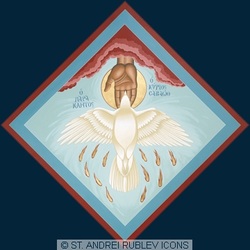 Last week I was visiting a childhood friend, realizing that it has been decades since we became friends. The time spent visiting was wonderful. Though apart for many years, it was as if we had not skipped a beat. It was really quite a gift. We had fun catching up and sharing the adventures of our lives, some joyous and some not so joyous. In all, the blessings seem to outweigh the sufferings mostly because when one is with a friend there is always the light of love to make whatever came before seem just a bit less difficult. Not surprisingly, part of our time together included a series of new shared adventures. We also had a few travel "misadventures" which culminated in my trip back home. One day we tried to get to the airport to pick up a friend and we ended up stuck in traffic for quite a while due to a flooded underpass. We concluded that it was better to have sat in the car for all that time then to have stood in a crowded airport. The next day while returning from the city, we had to leave the train early due to a problem on the tracks ahead. Again we were stuck somewhere, only this time it was in a town far from our destination. It could have been worse, because it was only an hour that we waited to be transported to our destination. The final event of this "trifecta of travel woes" came as my husband and I were flying home after the visit. After an uneventful first flight, the connecting flight was cancelled. It was unbelievable. We were “stranded” in an airport for 5 hours waiting for the flight home, only to get stuck on the plane for another hour due to a thunderstorm. Just to be sure, I am not planning any cruises or boat travel in the near future! The point of all this is that life is filled with adventures, and in adventures things do not always go as we hope or plan. In the situations I just mentioned, there were happy endings, but in between there were many annoyances. We “lost” hours we could have used for something else in the midst of all the delays. But what made it all bearable was that I was with friends in all three of these situations. Annoying as it was, we were able to enjoy each other; the time was not wasted at all, even if our plans were altered. What helped the most was having a sense of humor, not to mention a healthy dose of patience. In the end everything turned out okay, even if the path was not quite what we had hoped for. The sharing of time together was more important than our initial plans. What can make or break situations is not only our attitude about them, but also our set of expectations. The only expectation my friend and I had was to share time together. It really did not matter where we were, truly. We had great conversation stuck in traffic, stuck on the train, and stuck in a parking lot waiting to be bused back to our destination. I think we learned a lot about each other in the moment of adversity. There was no sense panicking or complaining. It was what it was. But what I think truly was present was the sense that we were not alone and so we could get through whatever it was together. So it is with friends! (And spouses!)  This is how it must have been for the apostles at Pentecost. In the three years that they were with Jesus they had their lives turned upside down a number of times. First they left everything in order to follow, which they did willingly, and then they started to discover what following actually meant. They were shocked to discover that no sooner had they spent a little time with Jesus, then He sent them away, two by two, out into towns and villages, telling them they could preach, heal, and cast out demons. Every time they thought they had it figured out, Jesus would surprise them and challenge their expectations by either something He did or something they were to do. No doubt their world was constantly rocked by what He revealed to them. The final change for them was when Jesus died. Even though He told them very clearly three times that He would die and rise, they were stunned when it happened. They ran and hid because of that shock. Even after Jesus rose they seemed in shock, continuing to hide in the Upper Room in Jerusalem until He came and explained things to them once again. Before He ascended Jesus told them to continue to wait in the Upper Room until the Holy Spirit came from on high to empower them. I wonder what they were thinking as they prayed and waited. By now they had to know that whatever this new experience was to be, it was not like anything they had imagined three years previously when they said yes to following Jesus. They must have been more at peace than ever before. Pentecost must have been a stunning experience for the 120 people who were in that Upper Room, (according to Luke). They had had remarkable adventures with Jesus. Some of those adventures were filled with joy, such as at the wedding at Cana, or watching a paralytic walk again. Some of them were terrifying, such as being caught in a storm thinking they would drown, or being with Jesus when he gave the Bread of Life sermon and the crowds got really upset with what He had said. Most difficult was the night Jesus was arrested and was subsequently put to death. However, their faith, even when shaky, was rewarded when He did indeed rise. So at Pentecost they had no clue what was in store, but by then they had learned not to worry about their expectations and truly opened up to the way the Spirit would lead them. They had become ready and open. Therefore they could receive what was being given. They could receive the power, and the responsibility which came with using it, given by the Holy Spirit. No wonder they were filled with such joy! The apostles knew that the road ahead was going to be filled with adventures, some joy-filled and some very painful. They understood that they would probably die similarly to how Jesus died. But in the light of eternity, it no longer mattered because they knew that in the end they would be doing the work of building the Kingdom in which they would reside forever with their Lord. They learned to accept whatever was before them and not to complain if it did not go as they expected or planned. It was not their plan that mattered, but God's plan. Therefore they were able to be filled with the joy of the Spirit which is the very gift of God. Best of all, they knew they were never alone. All of their experiences would be with a friend. Whether it was a fellow disciple or whether it was simply with the Friend of All Friends, Jesus, they were never alone in any of the events that befell them.  This Pentecost let us allow the Holy Spirit to help us accept the adventures of our lives, realizing that the difficult ones (especially) can teach us great lessons. This no pie in the sky platitude: as painful as life can be with its betrayals and all that is unfair and unjust, and with all that makes no sense at all, we can persevere in the knowledge that the Lord is with us always. The little annoyances and derailments can be overcome and can even be laughed at if we remember to keep it all in perspective. With the power of the Holy Spirit given us in the sacraments and through prayer we are never alone when the really big difficulties occur. The apostles are a great example of this. After Pentecost they went out to minister and every one of them suffered terribly in the end, just as Jesus had said. But they knew they were never alone and they knew that their lives had been in service of others. They touched many, sharing the joy of the Spirit and the love of Jesus. May we be open to new life and the renewal of our gifts from the Holy Spirit this Pentecost! May we be filled with the joy of the Holy Spirit and the fortitude to live the true Christian life, which is not always easy! May we share in many adventures with our friends and loved ones, knowing we are never alone and therefore find joy in the sharing! Let us meet in the Heart of Jesus, filled with the love of the Father, in the peace and joy of the Holy Spirit which knows no definition! The image at the top is The Holy Spirit, The Lord, the Giver of Life,The Paraclete, Sender of Peace by Rev. William Hart McNichols. It can be found at http://www.standreirublevicons.com/gallery.php?action=viewPicture&id=189 (A little Holy Spirit red for the occasion!) The two photos are mine. The first was taken at Gulf Shores, Alabama with the assistance of some filters to create the golden tones in the photo. I chose this photo because it reminded me of the Holy Spirit hovering over the waters in Genesis, the golden tones representing the glory of God. The last picture was cropped out of a photo I took in Ireland. (Can you tell?) I know it is not a dove, but to me it is symbolic of the Spirit descending. 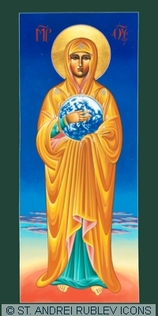 Last week while visiting a dear friend I had the occasion to attend a May crowning. It was a lovely service attended by quite a few people at my friend’s parish. It brought back many memories of that parish, but it was moving to see how many men and women were there with their children. There were people of all ages, boys and girls, men and women, who were leading prayers of the Rosary which we prayed as part of the service. It was moving and impressive to see so many people, young and old, praying together on a Monday night. For those who do not know what this is, a May crowning is when we honor Mary as the Mother of God's own Son during the month of May. The prayer ceremony involves placing a crown, usually made of flowers or something handmade, upon the head of a statue of Mary that resides inside or outside a church. It can involve praying a Rosary, which is a prayer that asks Mary's intercession for whatever the needs of the world (or the individuals praying) may be. To those who are not Catholic this practice may seem strange, or even archaic. I want to be clear about this: we do not worship Mary and we are not worshiping a statue! We worship God alone! To worship Mary would be heretical and to worship a statue would be idolatry. But we do venerate, or honor, Mary. We celebrate Mary for her faith and humility, and for her courage in saying yes to the difficult task of being the Mother of Jesus. The point of it is to remind us of her role as Mother of God and to remember that she intercedes for us, as she did when she was alive. Mary has always been a woman of prayer, as seen in the Gospels, so it should not surprise us to know that she continues in this role. She is also closer to Jesus than any other person, so we know that He listens to His mother, as any good son would do. It is not that she is able to get us everything we ask for, but she does intercede for our intentions, especially those that involve reparation for the sins of the world or for healing. May 13 is the feast of Our Lady of Fatima. It is celebrated on this day because in 1917 Mary began to appear to three children in Fatima, Portugal and continued to appear to them on the 13th of every month until October, 1917. Her message to the three children as they were shepherding their family flocks was one of repentance and prayer for reparation for the sins of the world. Russia had become Communist and the world was in the midst of a horrible war, something these children knew nothing about, given that they lived in a sleepy little hamlet with little news of it. And even if the children knew, they did not understand anything of world politics. When Mary appeared to them, it was because she had concern for the world and its fate. Mary wanted the children to spread the word to pray the Rosary and for people to renew their relationship with God by repenting and changing their ways. 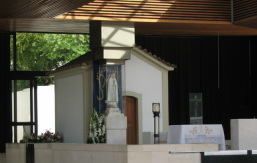 As any loving mother would do, Mary cares about her children, that is, the people of God. Throughout history she has appeared to others with a similar message. It is always because she loves us so much that she wants to make sure we are safely in the arms of her Son, Jesus. Mary was already a woman of prayer and of great faith when the angel came to her at the Annunciation. The Gospels tell us that after she said yes to God's request to be the mother of His Son, she was in prayer continually, pondering everything so as to know what God would have her do. That does not mean she understood everything. Had she understood it all, she would have had little reason to ponder. No, Mary was as much "in the dark" about the events of her life, and the meaning of Jesus life and ministry, as we are. She was without sin, yes, but was no more certain of events than we are. This is what makes Mary so holy: she accepted everything because she trusted in God. Paradoxically she was not exempt from suffering in this life because she was related to the Son of God. Rather, that relationship was what brought so much pain! She had to endure giving birth in a cave; she was told after Jesus’ birth that it would be as if a sword would pierce her heart because of Him; she had to run for her life with Joseph and Jesus shortly after His birth; she "lost" Him during a return trip from Jerusalem when He was a boy and spent an agonizing few days trying to locate Him, then had to accept His comment about being about His Father's business as an explanation. She had to watch others mistreat Jesus: she watched Him get crucified as a common criminal, though innocent, and then had to take His body from the cross to the tomb. No, I daresay her life was filled with suffering, (though I am equally sure that she had the joy of being with Jesus for all the years of His life, too.) But she did suffer silently throughout all of it, knowing who He was and how the people around Him were so completely clueless. What she endured during His lifetime would have been hard for any parent of any son; but to know exactly who He was had to make it nearly unbearable. After all, He was also her God whom she loved completely and without reserve. Many years ago while pondering the life of Mary I had an insight about her that has stayed with me. It was as if I heard these words within my mind: "The one who suffers in silence knows the most about love." I remember being a bit put off by the part about suffering in silence. It sounded as if we are to put up with "bad stuff" and learn to tolerate it. But in the years since then, with much thought about that, I have come to realize that Mary brought her suffering into the silence of listening. That is, she continually brought her experiences to God, not to question Him, but to find the strength to accept them. If one is silent, one turns outward to God. Mary had a history of turning outward to God and to others. Therefore this is clear to me now. If we want to persevere under the strain of our pains and sorrows and all the wounds that assail us big and small, we need to imitate Mary. In other words, we need to turn to God asking Him for comfort, for support, for insight, for the ability to forgive, for our own forgiveness and for the ability to go on. We need prayer because we need God. That is what it means to suffer in silence. 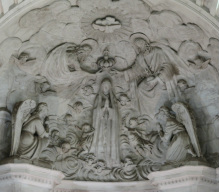 One last thing about suffering in silence: it leads to greater love and compassion. I have found that the more one's heart is broken the more one comes to have compassion for others who also are broken; that is, with the help of God. Without God, we cannot do this, but if we let the Spirit of God heal us and mold us, we learn to love more and more. This is what Jesus did in His ministry and this is what His mother did as she followed. This takes me right back to where we started: Mary as intercessor. It is because of love that she continues to intercede for us. Her broken, immaculate heart has filled with so much love that she continues to pour it out by helping us in our woundedness. She is so compassionate that she wants to go to her Son on our behalf. This is why we have May crowning and devotions to Mary. It is not because we have her on some sort of idolatrous pedestal. No, it is because she is the greatest role model for women as mothers (and even for men as fathers, I would venture to say). It is because she knows how to love unconditionally and cares about our well-being just as a loving parent cares about their own children. We are hers in a way, because Jesus entrusted us to her. Let us try to imitate Mary as people of faith, hope, and love. May we learn to love with the compassion of her heart! May we learn to listen in silence and hence understand what it means to wait upon the Lord! Let us learn to turn to Mary asking her intercession for our world! And may we let Mary lead us to her Son, as is her role! Let us continue to meet in the heart of Jesus of Nazareth, son of Mary and Son of God! Peace! ©Michele L. Catanese The icon at the top is Mary Most Holy Mother of All Nations by Rev. William Hart McNichols and can be found at http://www.standreirublevicons.com/gallery.php?action=viewPicture&id=323 The photos are mine. The photo midway through the entry was taken at Fatima, Portugal. The exact spot where Mary appeared is where the statue is located. The last photo was taken inside the basilica in Fatima, above the main altar, and depicts Mary being crowned as Queen of Heaven.  Years ago I heard the story of the Ascension of the Lord told in such a way that I have never forgotten it. The story was actually told with a bit of humor, and now I can never hear the story without thinking of the image which was provided. The person who was telling the story was a religious sister and we were on a retreat team together. She was one of the funniest people I have ever met, so it should not have surprised me to hear her ‘version’ of the Ascension. In her retelling of it, when she got to the point of Jesus leaving the apostles and being literally lifted up toward heaven, she said she had this mental image of the apostles seeing nothing but the soles of Jesus' feet rising higher and higher as He ascended to the Father. I have a vivid imagination, so now when I think of the Ascension all I can see in my mind's eye are the soles of Jesus’ feet! What makes her image of the story humorous is what is actually written in the Acts of the Apostles: “As they were looking intently at the sky as He was going, suddenly two men dressed in white garments stood beside them. They said, ‘Men of Galilee, why are you standing there looking intently at the sky? This Jesus who has been taken up from you into heaven will return in the same way as you have seen him going into heaven.’" The angels who appeared were urging the apostles to get back to Jerusalem to the Upper Room and pray until the Holy Spirit arrived. But what makes it sort of humorous to me is that the apostles are seemingly staring into the sky as if dumbfounded. The two angels have to rouse them from their astonishment. It is as if they are saying, "Get a move on folks. Standing here is not what Jesus has asked you to do. There is a church to be born and you need to be ready." Sometimes we can be so amazed at what happens in the Gospels that we can be pulled into that same sort of reverie. The stories are so amazing that we do not think that these sorts of things could possibly happen in our time. We wonder where all the miracles went, wondering, "Why don't I see miracles like they did?" The apostles were more accustomed to seeing miracles, we think, because they hung out with Jesus, so therefore this was no big deal for them. Obviously it was a big deal, or they would not have been gazing at the sky with their mouths open from the wonder of it all, no doubt. It seems to me that no matter how much they saw during their time with Jesus, including witnessing Him after His resurrection, they never did lose their sense of wonder and awe. The Ascension must have been so magnificent that they simply could not move, as if to wrap their minds around what they just had witnessed. As to the question of miracles, they have not stopped in the least; they have continued to happen throughout history through the intercession of the saints. Miracles did not die, rise, and ascend with Christ. He is still active in our world and will be until the end of time when He returns to complete the Kingdom He began during His ministry. There are countless stories of the miraculous concerning the work of the saints. In fact, the way a saint is brought forth for canonization requires that two miracles can be attributed to that person after their death. Some of the stories we have are of miracles that happened during their lifetime as well. But I think what keeps us from remembering this is our constant diet of negative news and information that makes it seem like there is nothing going on in terms of acts of God's miraculous power. But even in daily news, if one looks very carefully, there are stories of people being healed through medicine or of being saved by a hero’s actions at just the right moment. There are stories of babies who are born with health dilemmas who survive against all odds. There are stories of people reaching out and turning the life of another around through their love and care. These are not coincidences. They are the hand of God reaching out to those in need. But just as in the early church, God needs people to help accomplish the work. We cannot stand around looking at the sky, as if God will literally reach down with a giant hand (sort of like the feet rising image) and touch the person Himself. Rather, He needs disciples to help Him to reach out. Just as Jesus chose and empowered disciples, He continues to do so today. This is not to say that every difficulty will end with a miracle either. To think that would be naive. If we read the Gospels and the Acts of the Apostles, we will see that not every story ended in a miracle. Sometimes the miracle is simply getting through this life and entering into Heaven. The why and how of it are a mystery known to God alone. However, the point for you and me is to remember that as St. Teresa of Avila said, we are His hands and His feet now; this is the work of apostles and disciples. We are the ones who have to work for justice and peace. We are the ones called to be healers of the bodies, minds, and spirits of others in whatever way we can. Prayer is excellent, but action needs to flow from our prayer. In prayer, we ask God to help the other, but we should ask to be empowered to help as we can, too. Some issues require God to act in a way that we cannot: that is, doing the seemingly impossible. But many others may simply require a person to act as His instrument, just as the Apostles did. 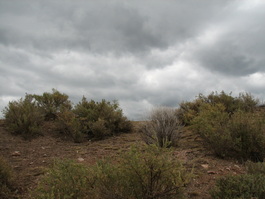 The Ascension was not Jesus leaving us forever. He did not tell the apostles, "I gave you power, now do it alone." Instead He told them to wait a bit more so they could receive the Holy Spirit. That means that what He was giving them was access to His power. They were not to possess the power of God, but to be instruments of it. His Ascension allowed that to happen. Once He was in Heaven, the Spirit could come and help the Apostles know how to proceed. The Spirit would give them guidance, wisdom, comfort, instruction, words to speak, the ability to heal and to forgive, and other gifts they would need to build the Church. The Spirit continues to give those gifts to us. Not only do we receive spiritual gifts through Baptism and Confirmation, we can also receive specific gifts such as patience and perseverance or whatever we need. All we have to do is ask in the name of Jesus and the Spirit will give us the grace we need. Blessed Mother Teresa of Calcutta once said: "I have never had clarity and certitude, I only have trust." That trust is a grace from God. It was how she persevered through years of what she called darkness, when she did not have any sense of God's presence. Look how powerful that grace was: she helped countless of the poorest of the poor to die with dignity. That is indeed a miracle. She did it one person at a time and it grew to a world wide effort. As we celebrate the Ascension this year let us reflect on what Jesus is asking of us as His disciples. We can look intently at the sky if we are looking for inspiration through beauty, but we need to let ourselves be moved to action. No matter how small or large a feat (pun intended) we need to accomplish, if it is done with love it is what He would have us do. The Ascension was important for us as His people. It reminds us that we have the power of the resurrected Christ among us and that with this power, we can rise above our own weaknesses. One day we will reside in the Kingdom of Heaven and see Him as He is, face to face. For now, we need to see Him in the faces of those we love and serve. May we be inspired by grace to see the opportunities put before us by God to be His hands and feet on earth! May we be like the apostles, attuned to the angels around us who inspire us to move to action! May we realize that Jesus is with us aiding us in performing works of mercy and love! And may we never lose our sense of the miraculous in our world! Let us continue to meet in the Heart of our Ascended and Glorified Lord! Peace! 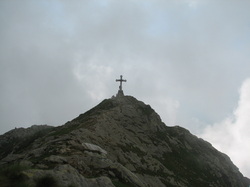 All the photography is mine. The first two photos were taken in New Mexico. The first one was taken near Taos and the second was taken just outside Santa Fe. The bottom photo, (to the left) was taken on top of Mt. Mucrone in northwestern Italy during a climb while on pilgrimage in the footsteps of Bl. Pier Giorgio Frassati. We had ascended the mountain, and while I did not see any feet rising into the clouds, it was quite a feat for me to have gotten up there! |
Heart Speaks to Heart
|

 RSS Feed
RSS Feed

